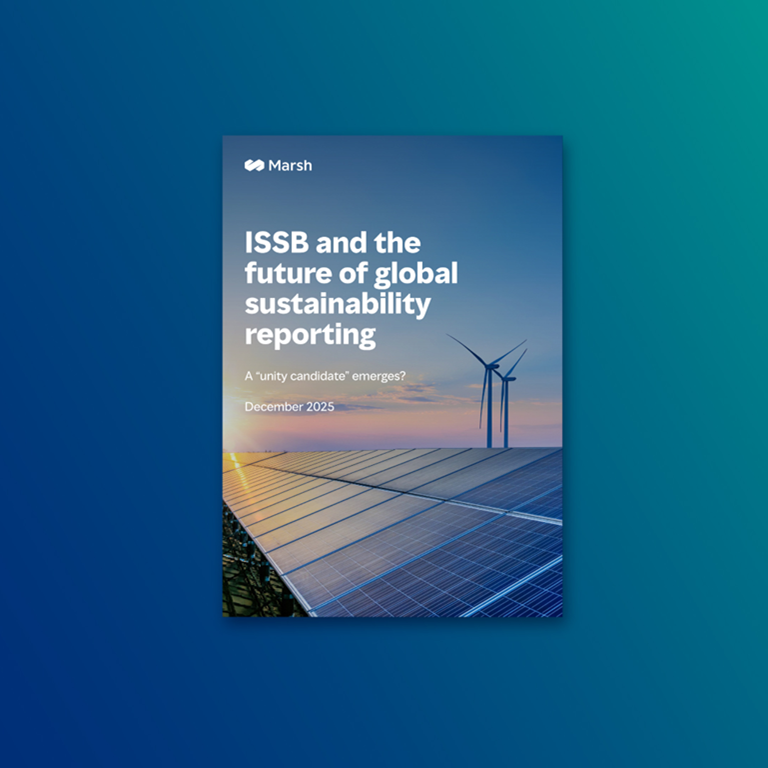
By Amy Barnes ,
Head of Energy & Power, Head of Climate & Sustainability Strategy, Marsh Risk
09/15/2025 · 4 minure read
With over 900 events scheduled between September 21 and 28, this year’s New York Climate Week should help counter any uncertainty with confidence and demonstrate that businesses remain firmly committed to climate action and net-zero goals.
This year’s theme, “Power On,” reflects the ongoing momentum. New York Climate Week offers a platform for businesses to assess how, collectively, they are progressing towards meeting their goals in areas such as climate change mitigation, adaptation, and sustainable finance.
Across all three areas, the insurance industry plays a critical role. Here are some key themes I expect to engage with from an insurance industry perspective during the week.
Climate mitigation and adaptation efforts often require significant capital investment. By working with risk and insurance specialists, organizations can overcome barriers related to risk perception and bankability, thereby expediting projects and scaling solutions.
Traditionally, the insurance industry relies on historical records to assess risk. However, many decarbonization projects involve new technologies that introduce unfamiliar risks. To support these first-of-a-kind initiatives, the insurance industry is developing new solutions that can unlock financing opportunities and make investments more secure.
One example is a new off-spec CO2 liability insurance product Marsh has developed with HDI Global. It is designed to address off-spec carbon dioxide liability in carbon capture and storage (CCS) value chains.
Other decarbonization technologies similarly face novel risks, from commissioning issues and performance drops to regulatory or tax policy changes. By addressing these novel risks head-on, the insurance industry can help facilitate access to finance that might otherwise remain unavailable.
Meeting future electricity demands for data centers is essential to unlocking the business and economic potential of transformative technologies such as AI. As data center energy consumption is projected to more than double by 2050, transitioning to cleaner and renewable energy sources will be crucial for meeting this growing demand and promoting long-term resilience.
The challenge lies in shifting away from non-renewable sources through expanding renewable capacity, improving grid infrastructure, and adopting strategic energy sourcing.
Investors may be concerned about the availability and reliability of power for new data centers, as continuous operation is vital — servers cannot be offline and cooling systems must run constantly. There is also growing interest in fusion technology as a potential clean power source for data centers.
Effectively managing these issues, as well as the related traditional and emerging risks, requires early engagement with risk and insurance teams. Cross-sector conversations — such as those facilitated by New York Climate Week — are key to developing collaborative solutions for this energy-intensive sector.
As I said in my recent TED talk, insurance fundamentally relies on the premiums from the many covering the losses of the few. However, as climate change makes extreme weather events more frequent and severe, the traditional insurance model faces challenges.
In many parts of the world, climate-driven disasters are becoming so frequent that the cost of risk is becoming too high to bear for some. For example, the Insurance Bureau of Canada, estimates that 10% of homes can no longer be affordably insured because extreme weather events have become too certain. This isn’t a failure of the insurance industry, but a clear sign that, in places, the cost of risk has become unsustainable.
Stepping up efforts to reduce emissions is one necessary part of the response. But adapting to the increasing frequency and severity of extreme weather is equally important. That involves investing in resilient infrastructure — such as green roofs that mitigate wildfire risk or elevating electrical equipment in flood-prone areas.
These measures require funding, and the insurance industry can help to direct capital to where it’s most needed.
Only by accurately assessing and pricing climate risks can we incentivize investments in resilience.
Climate change is not going away, but neither is the commitment by private sector organizations to support mitigation and adaptation. I look forward to New York Climate Week providing a platform for meaningful discussions on how we can all most effectively play our part.
Marsh Risk is a business of Marsh. This document and any recommendations, analysis, or advice provided by Marsh (collectively, the “Marsh Analysis”) are not intended to be taken as advice regarding any individual situation and should not be relied upon as such. The information contained herein is based on sources we believe reliable, but we make no representation or warranty as to its accuracy. Marsh shall have no obligation to update the Marsh Analysis and shall have no liability to you or any other party arising out of this publication or any matter contained herein. Any statements concerning actuarial, tax, accounting, or legal matters are based solely on our experience as insurance brokers and risk consultants and are not to be relied upon as actuarial, tax, accounting, or legal advice, for which you should consult your own professional advisors. Any modeling, analytics, or projections are subject to inherent uncertainty, and the Marsh Analysis could be materially affected if any underlying assumptions, conditions, information, or factors are inaccurate or incomplete or should change. Marsh makes no representation or warranty concerning the application of policy wording or the financial condition or solvency of insurers or reinsurers. Marsh makes no assurances regarding the availability, cost, or terms of insurance coverage. Although Marsh may provide advice and recommendations, all decisions regarding the amount, type or terms of coverage are the ultimate responsibility of the insurance purchaser, who must decide on the specific coverage that is appropriate to its particular circumstances and financial position.
1166 Avenue of the Americas, New York 10036
Copyright © 2025, Marsh LLC. All rights reserved. 24-362084-GL

Report,Featured insight
01/05/2026

Article,Featured insight
12/01/2025